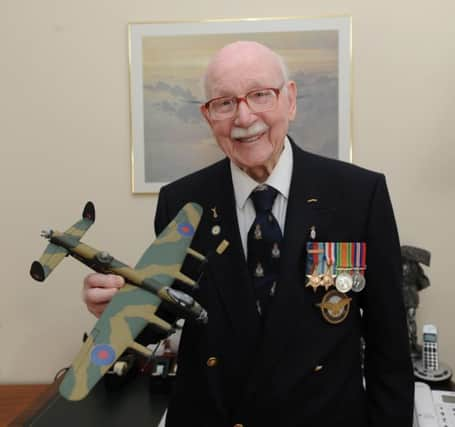Pilot’s ‘miracle’ escape from certain war death


Now 93 and living in Hassocks with his wife Beryl, he recalled his story. “There was an explosion, a vivid flash. There was no time for my life to flash before my eyes. I knew the end was now. When you’re spinning at 300mph there’s not much you can do about it.
“Having passed out, it’s a miracle what happened next. I was suddenly in the sky regaining consciousness. I could see my blazing aircraft right by me!”
Advertisement
Hide AdAdvertisement
Hide AdReg believes he and three others in the cock-pit were pressed against the roof with such force they forced it open.
Seconds before slamming into the ground, he woke up.
“Subconsciously I pulled my parachute. I didn’t have to think about it,” he said.
“It all seemed to happen in seconds. I escaped from certain death.”
The other men in the cock-pit had the same experience as Reg, having been forced unconscious by extreme g-forces.
Advertisement
Hide AdAdvertisement
Hide AdReg was then captured by the German army as a prisoner of war, and in solitary confinement for five days.
“I didn’t give them any information at all,” he said.
“They wanted me to be terrified but I wasn’t terrified. I had an incredible feeling of calmness. Only hours before I was about to be killed, it was a miracle, wasn’t it?!”
Reg was intimidated and threatened by ‘bully boys’.
He was a prisoner for nine months, and was ‘starving’ due to being fed minimal amounts of potato soup and bread, until his camp was liberated by the Russians.
“I was aware of the ground vibrating, suddenly everyone was running across the camp, towards the gate,” he said.
“It was an exciting moment in my life.”
Advertisement
Hide AdAdvertisement
Hide AdReg is proud of his collection of badges and medals from his time in the RAF, and is particularly fond of a caterpillar badge.
“I owe my life to the caterpillars, they spun the parachute silk thread that saved me,” he said.
Reg has two daughters, four grand children - one of which works in the RAF, and three great-grandchildren.
He continued: “I’m a very lucky man, to have survived that miracle escape in the face of certain death spinning downwards, what were the chances of making it to 93?”
Reg volunteered to the RAF on his 19th birthday.
Advertisement
Hide AdAdvertisement
Hide Ad“I was extremely fortunate to be in bomber command at all,” he said.
He was sent to the USA to train American pilots at the start of the war.
Reg continued: “I was 20 and the Americans were 25 and 26. I felt like a schoolboy. That’s when I grew my moustache, and I’ve still got it now!
“I got a bit anxious. When they told me I was my heart sank, I thought ‘I’m going to miss the war’. I wanted to get back home to fight the Germans.”
But he was eventually sent to battle.
Advertisement
Hide AdAdvertisement
Hide Ad“My job was to get us there, to navigate, plot the course, check the speed, make sure we arrived on time to the target,” he said.
Reg was an expert pilot, confident at performing complex life-saving aerobatics.
He would dive the plane in a tight spiral, and corkscrew upwards to avert the danger.
On one such occasion, a cannon shell went straight through the gunner cock-pit’s Perspex window and out the other side without exploding, thanks to angle of the plane during Reg’s manoeuvre.
“We didn’t suffer from fear, the job we were doing was exciting,” Reg added.
“We didn’t think about being brave, we knew we had a job to do, we knew we had to win the war.”